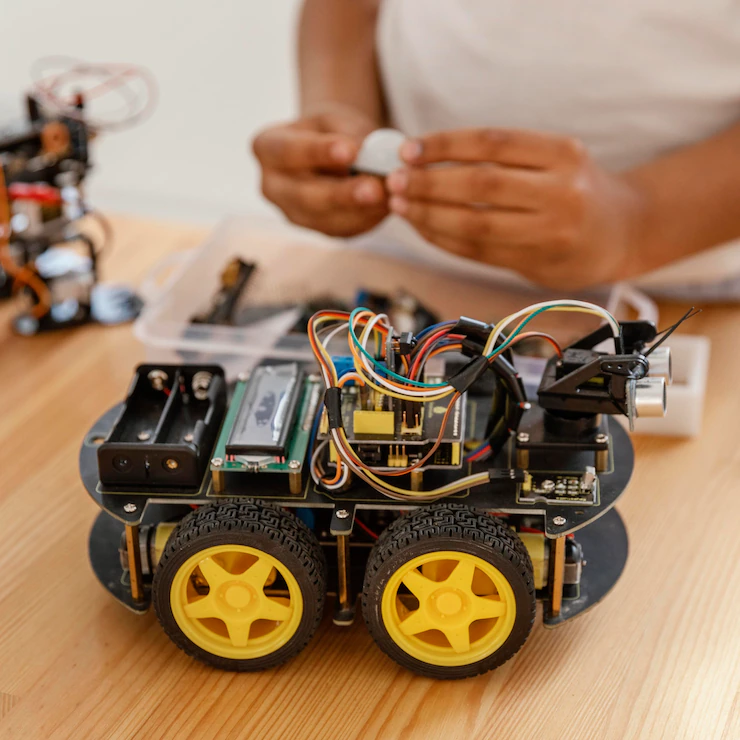
Prototyping and Testing
From Concept to Reality: Ensuring Precision and Excellence
What We Offer in Prototyping and Testing
1. Rapid Prototyping
- Create functional prototypes quickly to validate concepts and designs.
- Use advanced technologies like 3D printing, CNC machining, and PCB prototyping.
2. Proof-of-Concept Development
- Transform ideas into tangible prototypes to test feasibility and functionality.
- Ensure alignment with project goals and requirements.
3. Functional Testing
- Validate the performance of prototypes under real-world conditions.
- Identify and resolve design flaws before full-scale production.
4. Iterative Prototyping
- Refine prototypes through multiple iterations based on feedback and testing results.
- Enhance performance, usability, and reliability with each iteration.
5. Hardware Testing
- Comprehensive testing of electronic components, sensors, and actuators.
- Ensure compatibility, durability, and performance across various environments.
6. Software Integration Testing
- Test the integration of software with hardware systems for seamless operation.
- Identify and address any compatibility or performance issues.
7. Environmental and Stress Testing
- Evaluate prototypes under extreme conditions, such as temperature, humidity, and pressure.
- Ensure durability and reliability for critical applications.
8. Compliance Testing
- Verify that prototypes meet industry standards and regulatory requirements.
- Prepare products for certification and market entry.
9. User Experience Testing
- Assess usability and functionality from the end-user’s perspective.
- Collect feedback to improve design and user satisfaction.
10. Final Validation
- Conduct comprehensive tests on the final prototype to ensure readiness for production.
- Provide detailed reports and recommendations for mass manufacturing.
Benefits of Prototyping and Testing
- Risk Reduction: Identify and resolve design flaws early in the development process.
- Cost Savings: Avoid costly errors in mass production by validating designs upfront.
- Improved Performance: Optimize functionality, usability, and reliability through iterative testing.
- Faster Time-to-Market: Accelerate product development with efficient prototyping methods.
- Regulatory Compliance: Ensure products meet industry standards and certifications.
- User-Centric Design: Deliver products that align with user needs and expectations.
Applications of Prototyping and Testing
1. Product Development:
- Validate designs for consumer electronics, industrial equipment, and IoT devices.
2. Industrial Automation:
- Test automation systems, robotics, and control panels for efficiency and reliability.
3. PCB Development:
- Prototype and test circuit boards for performance and compliance.
4. Mechanical Engineering:
- Create and test mechanical components, assemblies, and systems.
5. Medical Devices:
- Develop and test prototypes for accuracy, safety, and usability.
6. Automotive Industry:
- Validate components like sensors, actuators, and control systems.
7. Smart Home Systems:
- Test the functionality of IoT-enabled devices and automation systems.
Why Choose Taraipi Automation for Prototyping and Testing?
- Advanced Tools and Technologies: We use state-of-the-art equipment for accurate and efficient prototyping.
- Experienced Team: Our engineers and technicians bring expertise across multiple domains.
- End-to-End Support: From concept to final validation, we provide comprehensive services.
- Tailored Solutions: Custom testing strategies designed to meet your specific project needs.
- Quality Assurance: Rigorous testing protocols to ensure performance, reliability, and safety.
How We Work
- Requirement Analysis
- Understand project goals and define prototyping and testing requirements.
- Prototyping
- Develop prototypes using the latest tools and techniques for rapid creation.
- Testing
- Conduct thorough testing across functionality, usability, and compliance parameters.
- Feedback and Iteration
- Incorporate feedback and refine prototypes for optimal performance.
- Final Validation
- Deliver a fully tested prototype ready for production and market launch.
